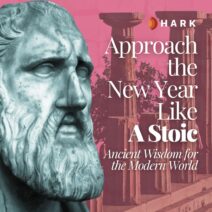What Is Heimarmene? Understanding the Stoic Meaning and Practice

What Is Heimarmene?
Heimarmene in Stoicism is the concept of fate, the rational order of cause and effect that governs the universe. It means that everything unfolds through a connected chain of events shaped by reason (logos). For the Stoics, understanding Heimarmene helps us accept what happens without despair or resistance. In modern life, it reminds us to focus on what we can control and trust the order that lies beyond our view.
Breaking Down the Word
Heimarmene (εἱμαρμένη) comes from the Greek verb meiresthai, meaning “to receive one’s share” or “to be allotted.”
- Literal meaning: “That which has been allotted”, a person’s portion or destiny.
- Philosophical meaning: The unfolding chain of causes determined by nature’s reason.
- Why this matters: Heimarmene reframes “fate” from superstition into structure. It shows that the cosmos is not random but organized, and our task is to align our choices with that order.
Key Dimensions of Heimarmene
- Causal order: Everything arises from a sequence of causes and effects. Nothing stands outside this rational web.
- Interconnectedness: Our actions are “co-fated” with others; we influence and are influenced within the same chain.
- Acceptance and agency: Fate governs outcomes, but our judgments and actions still matter within that order.
- Perspective training: Recognizing Heimarmene helps us see setbacks as part of a larger whole, not personal punishment.
Core Stoic Principles Connected to Heimarmene
- Reason (logos): Fate is not blind; it’s guided by universal reason. Living in harmony with Heimarmene means trusting this rational structure.
- Virtue (arete): Virtue is our response to fate, acting rightly no matter what occurs.
- Nature (physis): To live according to nature is to accept our place within the causal flow of the universe.
- Wisdom (sophia): Wisdom sees that understanding fate brings peace, because nothing truly good can be taken from us.
Modern Misunderstandings
Heimarmene is not fatalism. Stoic fate does not erase free will; it defines the context in which free will operates. We choose our attitude and actions within the web of cause and effect.
It’s also not superstition. Heimarmene isn’t about luck or destiny written by gods, it’s the natural logic of how things unfold. Thinking of it this way shifts us from asking “Why me?” to “What can I do now?”
Why Heimarmene Is Central to Stoicism
Chrysippus described fate as “a sequence of causes, an unbreakable ordering of the whole.” This vision lies at the heart of Stoic ethics. By recognizing that everything happens through reason, Stoics learned to act with integrity without clinging to outcomes. It can be noted that this view preserves responsibility while affirming universal necessity. To understand Heimarmene is to see that freedom is not escape from order but alignment with it.
Practical Applications of Heimarmene
- Journaling: Ask, “What happened today that I resisted? How might it fit within a larger pattern?”
- Pause before reaction: When something unexpected happens, remind yourself, “This too is part of the order.”
- Mindset check: Each morning, reflect: “I can choose my actions, but not the results. Both are within Heimarmene.”
- Perspective practice: View your challenges through the Stoic lens of control, accept what you can’t change, and direct energy where you can.
For more guidance, explore Stoic coaching or read our Stoic quotes for daily reflection.
FAQ
What does Heimarmene mean in Stoicism?
Heimarmene means the rational order of causes, the Stoic idea of fate that shapes everything according to reason.
Is Heimarmene the same as destiny?
No. Destiny suggests prewritten outcomes; Heimarmene describes the ongoing, logical unfolding of nature’s order.
Can anyone live in harmony with Heimarmene?
Yes. By practicing acceptance and focusing on virtue, anyone can align their actions with the flow of fate.
Conclusion
In modern Stoic language, this understanding becomes what later thinkers called amor fati, the love of one’s fate. It’s not just accepting what happens but embracing it as part of a larger rational order. When we love what fate brings, we stop wishing the world were different and start working with it, wisely and willingly.
Heimarmene in Stoicism teaches that life is not chaos but coherence. Every event follows a reasoned order, even when we can’t see it. Instead of fighting what happens, Stoicism invites us to cooperate with it, to live wisely within the current, not against it. Each moment becomes an opportunity to act well, accept reality, and trust the unfolding of the whole.
Want to explore more Stoic practices?
Book a free consultation with one of our Stoic Coaches or learn about more Stoic philosophy terms. You can also listen to the Via Stoica podcast on Spotify or Apple Podcasts or watch it on YouTube.
Author Bio
Benny Voncken is the co-founder of Via Stoica, where he helps people apply Stoic philosophy to modern life. He is a Stoic coach, writer, and podcast host of The Via Stoica Podcast. With almost a decade of teaching experience and daily Stoic practice, Benny creates resources, workshops, and reflections that make ancient wisdom practical today.
Related Posts
-
 Greek Stoic Philosophy Terms
Greek Stoic Philosophy TermsWhat Is Ekklisis? The Stoic Art of Avoiding What Harms Your Character
What Is Ekklisis? Ekklisis in Stoicism is the rational refusal to engage with what would damage one’s moral choice. The Stoic meaning of ekklisis is important because it teaches us what to turn away from, not out of fear, but out of commitment to living well. In daily life, ekklisis helps us step back from […]
Read more -
 Via Stoica Podcast
Via Stoica PodcastA Hark Audio Curated Stoic Playlist for 2026
At the start of a new year, there is often an unspoken promise that things will somehow be different. Calmer. More ordered. More predictable. Yet life rarely follows that script. Delays disrupt flights, plans break down, people drift away, and life brings events we cannot control. What we can work on, and what Stoicism has […]
Read more -
 Book Reviews
Book ReviewsThe Stoic Leader by John Sellars and Justin Stead
The Stoic Leader introduces Stoicism as a practical philosophy and explores how its principles shape leadership, judgment, and character in both work and life. Summary Written by John Sellars and Justin Stead, The Stoic Leader offers what is effectively two books in one. Sellars provides an introduction to Stoicism and its philosophical foundations, while Stead […]
Read more


Comments 0